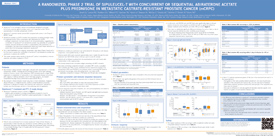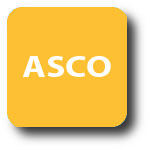CHICAGO, IL USA (UroToday.com) - Presented by Small EJ,1 Lance RS,2 Redfern CH,3 Millard FE,4 Gardner TA,5 Karsh LI,6 Dawson N,7 McCoy C,8 Stubbs AC,8 DeVries T,8 Sheikh N,8 and Shore ND9 at the American Society of Clinical Oncology (ASCO) Annual Meeting - May 31 - June 4, 2013 - McCormick Place - Chicago, IL USA
1University of California San Francisco, San Francisco, CA, USA; 2Eastern Virginia Medical School, Norfolk, VA, USA; 3Sharp Clinical Oncology Research, San Diego, CA, USA; 4Moores UCSD Cancer Center, San Diego, CA, USA; 5Urology Indiana University Health, Indianapolis, IN, USA; 6The Urology Center of Colorado, Denver, CO, USA; 7Georgetown University Medical Center, Washington, DC, USA; 8Dendreon Corporation, Seattle, WA, USA; 9Carolina Urologic Research Center, Myrtle Beach, SC, USA
ABSTRACT:
A randomized phase II trial of sipuleucel-T with concurrent or sequential abiraterone acetate (AA) plus prednisone (P) in metastatic castrate-resistant prostate cancer (mCRPC)
Eric Jay Small, Raymond S. Lance, Charles H. Redfern, Frederick E. Millard, Thomas A. Gardner, Lawrence Ivan Karsh, Nancy Ann Dawson, Candice McCoy, Andrew Stubbs, Todd DeVries, Corazon P. dela Rosa, Nadeem A. Sheikh, Neal D. Shore
University of California, San Francisco, San Francisco, CA; Eastern Virginia Medical School, Norfolk, VA; Sharp Clinical Oncology Research, San Diego, CA; Moores UCSD Cancer Center, San Diego, CA; Urology Indiana University Health, Indianapolis, IN; The Urology Center of Colorado, Denver, CO; Georgetown University Medical Center, Washington, DC; Dendreon Corporation, Seattle, WA; Carolina Urologic Research Center, Myrtle Beach, SC
Background: Sipuleucel-T and AA + P are FDA-approved for asymptomatic/minimally symptomatic mCRPC. Suppression of the androgen axis can be immunostimulatory and AA suppresses circulating androgen levels; AA plus sipuleucel-T may therefore be synergistic. However P used with AA, which may be immunosuppressive, has not been studied with concurrent sipuleucelET and could impair sipuleucel-T production and/or immunologic response. P11-3 (NCT01487863) is the first study to evaluate the combination of sipuleucel-T and AA + P.
Methods: Patients (pts) with asymptomatic/minimally symptomatic mCRPC were randomized (1:1) to sipuleucel-T (3 infusions at approx 2-wk intervals) with up to 26 wks of AA + P (AA 1000mg QD + P 5mg BID) starting 1 day after the first sipuleucel-T infusion (concurrent, arm A) or at 10 wks following the first sipuleucel-T infusion (sequential, arm B). Endpoints included the effect of AA + P on product (sipuleucel-T) characteristics eg antigen presenting cell (APC) activation, measured as CD54 upregulation (primary endpoint), APC (measured as CD54+ cells) and total nucleated cell (TNC) counts, as well as safety and immunologic responses.
Results: 31 pts in arm A and 32 pts in arm B completed sipuleucel-T treatment by the interim analysis (Nov 2012). Baseline characteristics were similar in the 2 arms. 60/63 pts received all 3 infusions of sipuleucel-T. No significant differences in median cumulative APC activation, APC count or TNC count were seen between the arms. Increased CD54 upregulation with the second and third treatments were indicative of a prime boost effect in both arms. Similar profiles of antigen-specific humoral and cellular immune responses were generated with no difference in magnitude of response between the arms (p > 0.05). The incidence of adverse events (AEs) and serious AEs was similar in both arms.
Conclusions: These data suggest sipuleucel-T can be successfully manufactured during concurrent AA + P. Product potency and prime boost effect were similar to sipuleucel-T alone. Immune responses and AEs were similar in both arms. It is not known if sipuleucel-T will provide similar efficacy with concurrent or sequential AA + P. Clinical trial information: NCT01487863.




